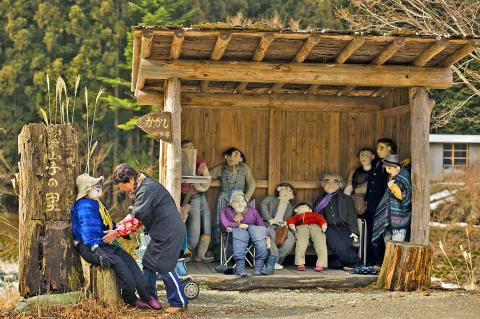Tsukimi Ayano made her first scarecrow 13 years ago to frighten off birds pecking at seeds in her garden.
The life-sized straw doll resembled her father, so she made more, and then could not stop.
Today, the tiny village of Nagoro in southern Japan is teeming with Ayano’s hand-sewn creations, frozen in time for a tableau that captures the motions of everyday life.

Photo: Reuters
Scarecrows pose in houses, fields, trees, streets and at a crowded bus stop — where they wait for a bus that never comes.
“In this village, there are only 35 people, but there are 150 scarecrows, so it’s multiple times more,” Ayano said.
Nagoro, like many villages in Japan’s countryside, has been hit hard by inhabitants flocking to cities for work and leaving mostly pensioners behind. Its graying community is a microcosm of Japan, whose population has been falling for a decade and is projected to drop from 127 million to 87 million by 2060.
At 65, Ayano is among the youngest residents of Nagoro. The village school was shut in 2012 after its two pupils graduated, but the building is now occupied by Ayano’s scarecrows — students at their desks and in corridors, a teacher by the blackboard, while a suit-wearing school principal looks on.
Each of the 350 scarecrows crafted by Ayano over the years was built on a wooden base, with newspapers and cloth used to fill them out. They are often dressed in hand-me-downs and the ones propped up outdoors lined with plastic to keep them dry.
Still, the weather plays spoilsport and Ayano has often had to replace scarecrows exposed to the open air.
Sometimes, the new ones she makes are made to order, usually in the likeness of young people who have left Nagoro for work or residents who have died.
“They’re created as requests for those who’ve lost their grandfather or grandmother,” said Osamu Suzuki, a 68-year-old resident. “So it’s indeed something to bring back memories.”
Tourists have started to come, too, drawn by the two lifeless delegates guarding the road leading to the village, next to a board identifying Nagoro as “Scarecrow Village.”
Ayano is happy to show her work to visitors, as long as she is not disturbed while watching her favorite TV soap opera. On her daily rounds, she walks around the village bidding her motionless creations a good morning and tends to their needs.

POLITICAL PATRIARCHS: Recent clashes between Thailand and Cambodia are driven by an escalating feud between rival political families, analysts say The dispute over Thailand and Cambodia’s contested border, which dates back more than a century to disagreements over colonial-era maps, has broken into conflict before. However, the most recent clashes, which erupted on Thursday, have been fueled by another factor: a bitter feud between two powerful political patriarchs. Cambodian Senate President and former prime minister Hun Sen, 72, and former Thai prime minister Thaksin Shinawatra, 76, were once such close friends that they reportedly called one another brothers. Hun Sen has, over the years, supported Thaksin’s family during their long-running power struggle with Thailand’s military. Thaksin and his sister Yingluck stayed

In the sweltering streets of Jakarta, buskers carry towering, hollow puppets and pass around a bucket for donations. Now, they fear becoming outlaws. City authorities said they would crack down on use of the sacred ondel-ondel puppets, which can stand as tall as a truck, and they are drafting legislation to remove what they view as a street nuisance. Performances featuring the puppets — originally used by Jakarta’s Betawi people to ward off evil spirits — would be allowed only at set events. The ban could leave many ondel-ondel buskers in Jakarta jobless. “I am confused and anxious. I fear getting raided or even

Kemal Ozdemir looked up at the bare peaks of Mount Cilo in Turkey’s Kurdish majority southeast. “There were glaciers 10 years ago,” he recalled under a cloudless sky. A mountain guide for 15 years, Ozdemir then turned toward the torrent carrying dozens of blocks of ice below a slope covered with grass and rocks — a sign of glacier loss being exacerbated by global warming. “You can see that there are quite a few pieces of glacier in the water right now ... the reason why the waterfalls flow lushly actually shows us how fast the ice is melting,” he said.

Residents across Japan’s Pacific coast yesterday rushed to higher ground as tsunami warnings following a massive earthquake off Russia’s far east resurfaced painful memories and lessons from the devastating 2011 earthquake and nuclear disaster. Television banners flashed “TSUNAMI! EVACUATE!” and similar warnings as most broadcasters cut regular programming to issue warnings and evacuation orders, as tsunami waves approached Japan’s shores. “Do not be glued to the screen. Evacuate now,” a news presenter at public broadcaster NHK shouted. The warnings resurfaced memories of the March 11, 2011, earthquake, when more than 15,000 people died after a magnitude 9 tremor triggered a massive tsunami that